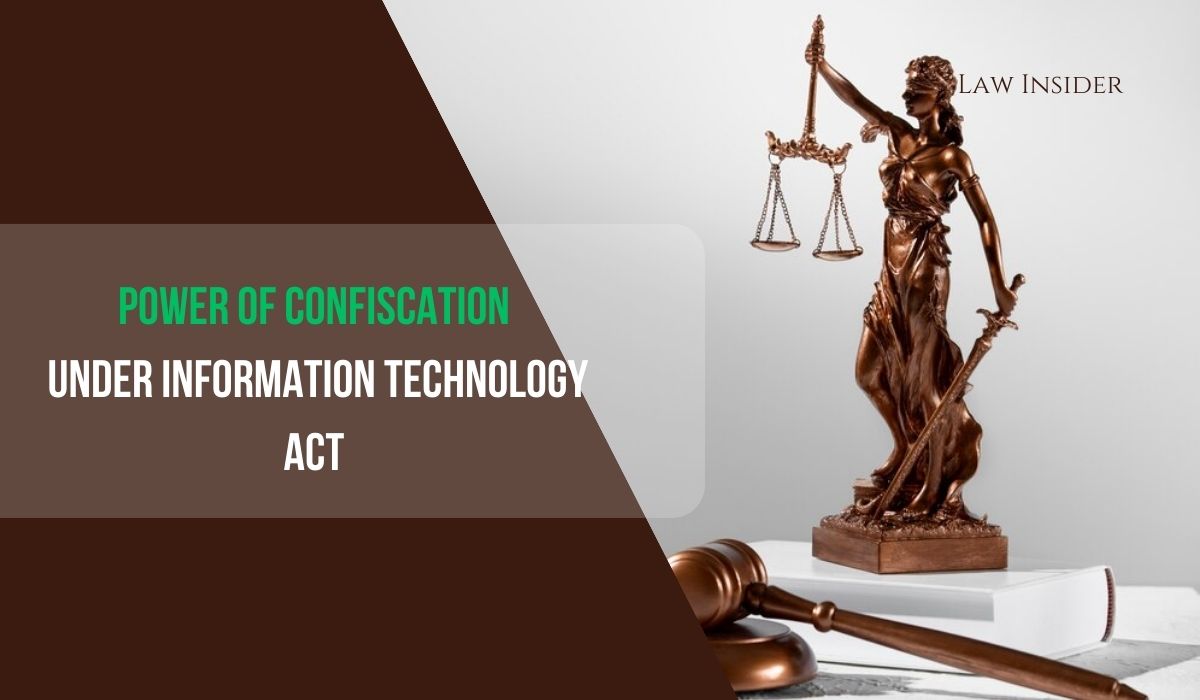By Ashutosh Vinay
Published on: December 15, 2023 at 11:01 IST
In the realm of law and governance, the power of confiscation has long been a contentious and powerful tool wielded by authorities. This legal authority empowers governments to seize assets and properties associated with criminal activities, aiming to curb illicit practices, deter potential wrongdoers, and ensure justice prevails. However, the exercise of this power also raises significant ethical and legal questions, prompting a careful examination of the delicate balance between the need for societal order and the protection of individual rights.Top of Form
In this article we will dive into the power to confiscate under the Information Technology Act, discussing its significance, scope, and implications to counter cyber threats.
What is Cyber Crime?
Cybercrimes encompass a broad spectrum, ranging from hacking and data breaches to online fraud and identity theft. As technology continues to evolve, so do the methodologies employed by cybercriminals. In this dynamic era, the power of confiscation becomes a critical component of a nation’s cybersecurity strategy, allowing authorities to swiftly respond to and neutralize emerging threats.
Power to Confiscate Under IT Law
IT laws typically confer the power of confiscation to law enforcement agencies and other relevant authorities. These provisions empower these entities to seize assets, data, or devices associated with cybercrimes. The legal framework often outlines specific conditions under which confiscation is permissible, ensuring that the power is exercised judiciously and in compliance with due process.
Section 76: Confiscation Of IT Act states the provision of confiscation states Any computer, computer system, floppies, compact disks, tape drives or any other accessories related thereto, in respect of which any provision of this Act, rules, orders or regulations made there under has been or is being contravened, shall be liable to confiscation:
Provided that: where it is established to the satisfaction of the court adjudicating the confiscation that the person in whose possession, power or control of any such computer, computer system, floppies, compact disks, tape drives or any other accessories relating thereto is found is not responsible for the contravention of the provisions of this Act, rules, orders or regulations made there under, the court may, instead of making an order for confiscation of such computer, computer system, floppies, compact disks, tape drives or any other accessories related thereto, make such other order authorised by this Act against the person contravening of the provisions of this Act, rules, orders or regulations made there under as it may think fit.
In essence we can say that Section 76 of the law pertains to the confiscation of computer related equipment and accessories in cases where there has been a contravention of any provision of the Act, rules, orders, or regulations made under it. Here’s a breakdown and interpretation of the section:
1. Confiscation of Equipment:
The section specifies that any computer, computer system, floppies, compact disks, tape drives, or other accessories associated with them, which have been or are being used to contravene the provisions of the Act, rules, orders, or regulations, are subject to confiscation.
2. Proviso Exception Clause:
The proviso introduces an exception to the general rule of confiscation. It states that if it is established to the satisfaction of the court responsible for adjudicating the confiscation that the person in possession, power, or control of the mentioned equipment is not responsible for the contravention, the court has the discretion to take an alternative course of action.
3. Court’s Discretion:
Instead of ordering the confiscation of the equipment, the court may choose to make an alternative order authorized by the Act against the person who contravened the provisions of the Act, rules, orders, or regulations. This provides the court with flexibility in determining an appropriate response based on the specific circumstances of the case.
4. Judicial Review:
The section emphasizes the importance of establishing, to the satisfaction of the court, the lack of responsibility on the part of the person in possession of the equipment. This implies that there is a process for judicial review, allowing the court to carefully consider the evidence and circumstances before deciding on the appropriate action.
5. Prevention of Unjust Confiscation:
The section, by incorporating the proviso, aims to prevent unjust confiscation by providing a safeguard for individuals who may be in possession of the equipment but are not involved in the contravention of the law. It ensures that the legal process is fair and just.
In summary, Section 76 grants the authorities the power to confiscate computer related equipment used in violation of the law, but it also introduces a safeguard by allowing the court to consider individual responsibility and opt for alternative measures if the person in possession is found not to be responsible for the contravention. This provision seeks to strike a balance between enforcing the law and protecting the rights of individuals.
Conclusion
The power to confiscate under IT law empowers law enforcement agencies to seize assets, data, or devices associated with cybercrimes. This authority is essential in swiftly responding to and neutralizing emerging cyber threats. Section 76 specifically addresses the confiscation of computer related equipment and accessories, establishing conditions for when confiscation is permissible.
The careful balance between enforcing the law and protecting individual rights is evident in the legal framework. Section 76 introduces a crucial safeguard through its proviso, allowing the court discretion in cases where the person in possession of the equipment is not responsible for the contravention. This ensures that the legal process remains fair, just, and subject to judicial review, preventing unjust confiscation.
Edited by: Bharti Verma, Associate Editor at Law Insider

